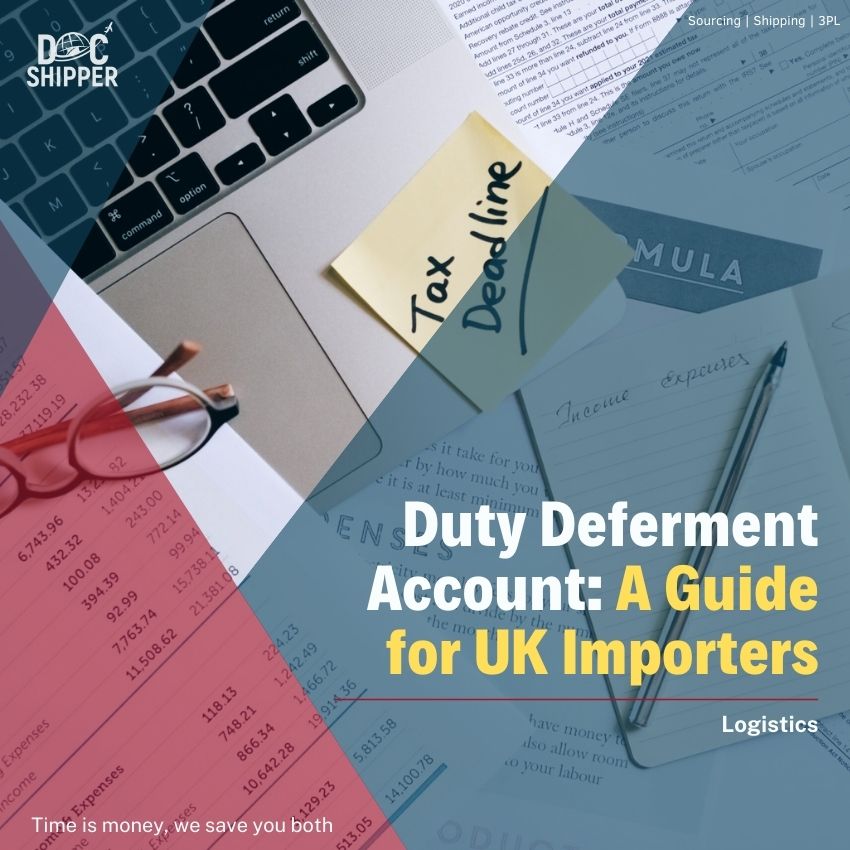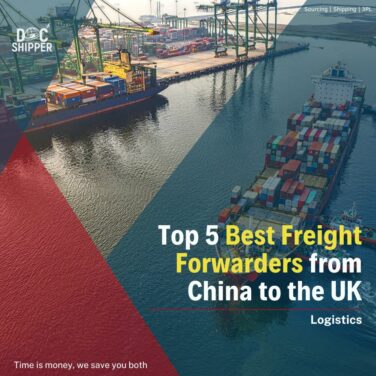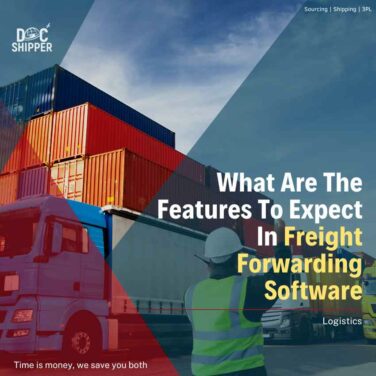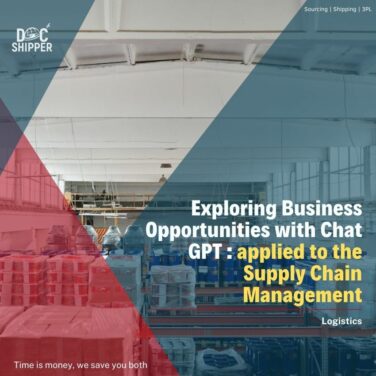Duty deferment is a convenient payment method for customs, import VAT, and excise duty. With a duty deferment account, you have the flexibility to delay payments for customs duty, import VAT, and excise duty. Instead of paying for each individual consignment upon import or release from an excise warehouse, you can make monthly payments to HMRC through Direct Debit.
Think of a duty deferment account as a trusty sidekick for importers. It offers a valuable line of credit, allowing them to pause customs duty and tax payments for imported goods. This flexibility is a game-changer, helping businesses navigate the challenges of importing and strategically managing cash flow.
Importing goods into the UK entails complicated financial obligations like customs duties and value-added tax (VAT). These costs can be burdensome, affecting competitiveness and financial stability. However, with a duty deferment account, importers gain a powerful advantage—they can postpone payments. This maintains a healthy cash flow and opens opportunities for overall financial improvement.
What is a Duty Deferment Account?
A duty deferment account is a financial arrangement provided by customs authorities that allows importers to postpone the payment of import duties and taxes on their goods. It serves as a line of credit, enabling importers to defer these financial obligations until a later date. This mechanism provides importers with greater flexibility in managing their cash flow and allocating resources strategically.
How does a duty deferment account work?
A duty deferment account functions as a means for importers to temporarily defer the payment of import duties and taxes. Here’s how it typically works:
- Account Establishment: Importers interested in utilizing a duty deferment account must apply with their local customs authority. The application process involves submitting the necessary documentation and meeting specific eligibility criteria.
- Credit Limit: Upon approval, importers are assigned a credit limit for their duty deferment account. This limit represents the maximum amount of import duties and taxes that can be deferred.
- Deferring Payments: When importing goods, importers can provide their duty deferment account details to customs authorities. Instead of paying the import duties and taxes immediately, these amounts are recorded as deferred payments.
- Accounting and Reporting: Importers are typically required to maintain accurate records of the deferred duties and taxes, along with any additional information required by customs authorities. Regular reporting may be necessary to reconcile the deferred amounts.
DocShipper Info
Are you looking for unmatched quality for your imported products in the United Kingdom? Choose our international transport and customs clearance services. We are committed to providing you with seamless and efficient logistics, as well as expertise in customs clearance to streamline your import operations. Contact us now to learn more and benefit from a comprehensive solution for your international logistics needs.
Why Should You Establish a Duty Deferment Account?
Establishing a duty deferment account offers numerous advantages for UK importers. It provides them with financial flexibility, cost savings, and improved cash flow management. Let’s explore the benefits in more detail by answering related questions:
What are the advantages of a duty deferment account for UK importers?
Establishing a duty deferment account is advantageous for UK importers due to the following reasons:
- Financial Flexibility: With a duty deferment account, importers gain the flexibility to defer payment of import duties and taxes. This allows them to allocate their financial resources strategically, ensuring that they have sufficient funds available for other business needs.
- Cost Savings: By deferring the payment of import duties and taxes, importers can effectively manage their costs. This enables them to use the funds that would have been allocated for duties and taxes to invest in business growth, such as product development, marketing, or expanding operations.
- Improved Cash Flow Management: A duty deferment account empowers importers to optimize their cash flow by postponing duty and tax payments. This flexibility can be particularly valuable during periods of fluctuating sales or economic uncertainties. Importers can better manage their financial obligations and maintain a healthier cash flow, which is crucial for the overall financial stability of their business.
In what ways does a duty deferment account streamline the customs clearance process?

DocShipper Info
We provide professional international transportation and customs solutions that are tailored to meet your specific needs. We understand that navigating these processes can be complex and time-consuming. By entrusting your imports to us, you can experience peace of mind and save valuable time. Contact us for a prompt and detailed quote within 24 hours!
What are the eligibility criteria and requirements for a duty deferment account?
Perhaps you’re curious about your eligibility and the specific requirements for a duty deferment account. Let’s delve into the details and explore them thoroughly :
Who is eligible to benefit from a duty deferment account?

What documents are needed to establish a duty deferment account?
Before establishing a duty deferment account, you should make sure you have all documents needed. Here is a list of the common document required :
– Business Registration: You must be a registered business entity, such as a sole trader, partnership, or limited company, involved in importing or releasing goods into Great Britain.
– EORI Number: You’ll need a valid Economic Operator Registration and Identification (EORI) number. This unique identifier is assigned to businesses for customs purposes. If you don’t have one, you can register for it on the dedicated page of the official UK government.
– Financial Stability: The HM Revenue and Customs (HMRC) will assess your financial stability to ensure you can meet your duty and tax payment obligations. While specific financial requirements aren’t mentioned, your business should demonstrate financial solvency and the ability to fulfill payment responsibilities.
– Other Documents: Depending on your business type and goods, additional documents may be necessary. These could include import licenses or certificates for specific goods, evidence of trading activity (e.g., sales invoices or purchase orders), or any other relevant documentation requested by the HMRC.
– Supporting Documents: Alongside your application, you’ll need to provide supporting documents, such as:
- Bank Statements: Recent bank statements that demonstrate your business’s financial standing and transaction history.
- Financial Accounts: Your most recent financial accounts, including profit and loss statements and balance sheets. These documents provide insights into your business’s financial performance.
- VAT Registration Certificate: If your business is registered for Value Added Tax (VAT), include a copy of your VAT registration certificate as proof.
- Guarantor’s Undertaking: In some cases, a guarantor’s undertaking may be required. This is a written guarantee from a third party, like a bank or financial institution, stating they will be responsible for any unpaid duties or taxes if your business fails to make the payment.
What are the steps to apply for a duty deferment account?
If you want to establish a duty deferment account, here is the general order in which you should proceed:
First, check if you have all the documents needed (seen above) and if you meet the eligibility criteria for applying for a duty deferment account. To utilize a duty deferment account in Northern Ireland or the UK, you must fulfill two requirements:
- – You must be an importer or a representative of importers.
- – You should have an approved guarantee or waiver.
Do I need a financial guarantee to apply for a duty deferment account?
Yes, if you want to apply for a duty deferment account, you need a guarantee. You can either use a guarantee or apply for a guarantee waiver approval. The main difference between having a guarantee and a guarantee waiver for a duty deferment account is the financial obligation and risk involved.
- Guarantee: With a guarantee, the account holder provides a financial guarantee, such as a bank guarantee or bond. This deposit ensures payment if the account holder fails to meet their obligations. You can apply for one on the official UK government guarantee page.
- Guarantee Waiver: A guarantee waiver eliminates the need for a financial guarantee. It is granted based on specific criteria, exempting the account holder from providing a security deposit.
How to apply for a guarantee waiver?
You can apply for a waiver if you have:
- – no serious or repeated infringements of customs or tax rules in the past 3 years
- – no record of serious criminal offenses related to your business activities in the past 3 years
- – held positive net assets (excluding goodwill) at the date of your application and for the past 3 years (or, if shorter, for the period you have been trading)
- – positive net assets (excluding goodwill) greater than the value of the waiver you are applying for at the date of your application, and at your most recent balance sheet date, to qualify for a guarantee waiver for an amount over £10,000
If you need to defer amounts above £10,000 per month but don’t qualify for a full guarantee waiver, you may still be eligible for a partial waiver of up to £10,000. A guarantee would only be required for the additional amount. Additionally, being established in the UK is a requirement. If you hold the status of an Authorised Economic Operator for Customs (AEOC and AEOF), you are eligible for a guarantee waiver up to your deferral limit.
DocShipper Tip
There are 2 types of guarantee waiver approvals:
- – Approval for a guarantee waiver to defer customs duty, import VAT and excise up to £10,000 per month
- – Approval for a guarantee waiver to defer customs duty, import VAT and excise up to a specified amount over £10,000 per month
Apply to defer Customs Duty
If you are established outside the UK, you cannot apply for a guarantee waiver. You must guarantee deferment of payment to HMRC.
First, if you want to defer Customs Duty, excise duty, and import VAT you must:
- Decide if you want to reduce financial guarantees by using a duty deferment account guarantee waiver approval or Authorised Economic Operator customs simplification (AEOC).
- Apply for a duty deferment account and optional guarantee waiver – send with your application a Customs Handling of Import and Export Freight (CHIEF) Direct Debit instruction.

You should not submit a guarantee unless you’re being asked to provide one after you have applied for a duty deferment account.
If you want to defer Customs Duty, you must:
- Decide if you want to reduce financial guarantees by using Authorised Economic Operator customs simplifications (AEOC).
- Apply for a duty deferment account and guarantee.
- Ask your bank, building society, or insurance company to guarantee your duty payments.
- Fill in a Direct Debit Instruction.
Apply to defer excise duty

If you want to defer excise duty, such as tobacco, alcohol, or certain oils, you must:
- Decide whether you want to reduce financial guarantees using the Excise Payment Security System.
- Apply for a duty deferment account and guarantee.
- Ask your bank, building society or insurance company to guarantee your duty payments.
- Fill in a Direct Debit Instruction.
Apply to defer import VAT
You can apply to defer import VAT if you are a trader who is either:
- not VAT registered
- VAT-registered and not accounting for VAT on your VAT Return
If you use postponed VAT accounting for imports, you do not need to apply for a deferment account to defer import VAT.
If you are registered for VAT, you do not need a duty deferment account to postpone payment of VAT. You can defer when you account for import VAT on your VAT Return.
To defer VAT if you are not registered for VAT or do not want to account for import VAT on your VAT Return, you must:
- Decide whether you want to reduce financial guarantees using Simplified Import VAT Accounting.
- Apply for a duty deferment account and guarantee.
- Ask your bank, building society or insurance company to guarantee your duty payments.
- Fill in a Direct Debit Instruction.
What should I do after I applied for a duty deferment account?

Once your application is approved and a Direct Debit is established, you will receive a deferment approval number. This number should be used for import declarations or removing goods from an excise warehouse.
Even if you don’t plan to use your duty deferment account immediately, it’s important to provide your direct debit instruction during the application. This may result in a delay in activating your account when you need it.
If your requested deferral limit exceeds the amount covered by your guarantee waiver, we will provide options such as obtaining a full or partial guarantee or accepting a reduced deferral limit. Failure to respond within 30 days may result in the rejection of your application.
DocShipper Alert
Compliance with customs regulations and accurate documentation is vital for duty deferment accounts. Our expert team ensures smooth operations, minimizing risks. Trust us for precision and peace of mind. Contact us today for a free quote within 24 hours.
When should I pay my deferred taxes with my duty deferment account?
When deferring Customs Duty, import VAT, and excise duties, the payment is made as a total sum for the deferred amount within a specific accounting period. For Customs Duty and import VAT :
- – The payment is due on the 15th of the following month
- – The next working day if the 15th is not a working day.
This allows for an average credit period of 2 to 6 weeks, approximately 30 days.
The same accounting period applies to excise duty, with payment due on the 29th of the following month or the working day before if the 29th is not a working day. VAT-registered individuals can account for import VAT on their VAT return.
How do I pay my deferred taxes with my duty deferment account?
Payments for deferred duties and import VAT must be made in pounds sterling using the BACS system or Direct Debit. The total deferred amount for the accounting period is automatically debited from your bank account and transferred to the designated bank account on the payment day. However, if the deferred amount exceeds £20 million, you must contact the Duty Deferment Office to obtain information on paying via CHAPS (Clearing House Automated Payment System).
DocShipper Alert
Need help shipping from or to the UK? DocShipper will take care of everything for you. Contact us today for a free quote within 24 hours.
Q&A | Duty Deferment Account: A Guide for UK Importers
Read more
Looking for more? These articles might interest you:
DocShipper Info: Did you like this article? You’ll probably like the following:
Need Help with Logistics
or Sourcing ?
First, we secure the right products from the right suppliers at the right price by managing the sourcing process from start to finish. Then, we simplify your shipping experience - from pickup to final delivery - ensuring any product, anywhere, is delivered at highly competitive prices.


Fill the Form
Prefer email? Send us your inquiry, and we’ll get back to you as soon as possible.
Contact us




